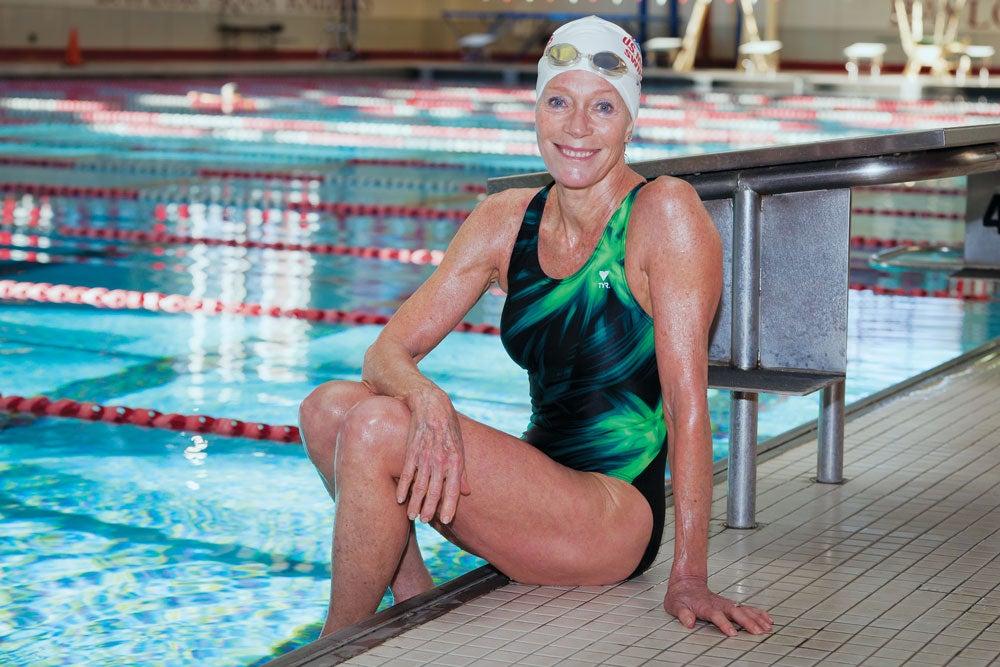If there’s anything people can learn from Diann Uustal ’68, it’s resilience. A horrific car crash in 2003 and a brutal fall in 2008 left her with crippling injuries. She has overcome the injuries, but still feels their lingering effects. She thrives nonetheless.
The other thing people can learn from Uustal is how to swim. She lives in a waterfront home in Jamestown, Rhode Island, with her husband of 50 years, Tom Uustal. They met when both were teen lifeguards. Today, she looks out on Narragansett Bay and watches a Coast Guard boat putter past Prudence Island. “I betcha I’ve taught some of those folks to swim,” she laughs.
She’s not kidding. Uustal, 72, a lifelong competitive swimmer who was recently—for the third time—named a World Masters Swimmer of the Year, trains at the U.S. Navy pool in Newport, where she also teaches military men and women to swim.
Uustal has 31 Masters world records to her credit, almost too many trophies and titles to count, and in 2016 alone, she established 13 national records and nine new world records in the 70–74 age bracket.
Although she’s a lifelong swimmer, she’s done a lot of her best work as an older competitor and while recovering from her injuries. In 2003, a woman talking on her cell phone crashed into Uustal’s car, leaving her with a severe spinal injury. In 2008, she slipped on a wet floor in an airport, blowing out a rotator cuff as she tried to break her fall, tearing her hamstring muscle off the bone. In both cases, doctors said she might not walk again, let alone swim competitively. Or at all.
“Success isn’t a medal around your neck or a digit on a scoreboard,” says Uustal, beaming a bright smile and flashing blue eyes. “It’s whatever it takes to get where you’re going and love it. For me, success is being able to accomplish some pretty unusual things in the face of daunting challenges.”
She’s always taken the unusual route. She’s a registered nurse specializing in palliative care, and has been one of the country’s top medical ethicists. In the 1970s, Uustal started a consulting firm, working with hospitals and doctors on difficult end-of-life cases. “I’d been teaching at a national conference at Boston University; someone saw me and said, ‘You have no idea how good you are,’” Uustal laughs. “She told me, ‘I can put you on a national stage.’ So by 1976, I had started my own firm, which was radical—a nurse starting her own consulting company.”
URI kick-started her nursing dream, she says: “It was at URI that I learned to be focused on healing and wellness, even in the face of disease, and to be a healer by being present to people. That’s a tall order for young neophytes in college, and I am grateful for the program and nursing professors at URI.”
Uustal has long loved to swim, having “chlorine in my blood,” she says. This is due hugely to her late grandmother, Ruth Coburn, who was an outstanding open-water swimmer. Uustal, in fact, is working to get her grandmother inducted into the Rhode Island Aquatic Hall of Fame at URI’s Tootell Aquatic Center because she competed her entire life, which was a radical achievement for a woman of her time. Coburn won her last trophy, Uustal says proudly, “on the day I won my first. She took me everywhere I needed to be as a kid, and hers was always the last voice I heard before the starting gun went off. She’s my heroine.”
And she was a tough coach: She’d take little Diann to the beach on a small lake in Apponaug, in Warwick, Rhode Island, where she’d connect herself to her granddaughter with a small belt, and together they’d swim to Goddard State Park. “She always had a small raft with us and would say ‘When you get tired, you can hang onto the raft, but there’s nothing free in life, you gotta keep kicking,’” Uustal says, relishing the memory. “When we’d get to the park, she’d bundle me in the sand to get warm, and get a hot dog for herself, hot chocolate for me.”
Uustal says the most important lesson she learned from her grandmother was humility. “She’d tell me, ‘You will win like a champion and you will lose like a champion,’ ” though the young girl, and much later, senior citizen, wouldn’t lose many meets.
Swimming, Uustal says, gives her a sense of peace and serenity, and a feeling of “re-creation of body, mind, and spirit; I’m more at home in the water than on land. I’m passionate about swimming and I love the camaraderie and challenging myself in competition.”
But she was forced to sit out Nationals and Pan American games this past summer because she was diagnosed with Ehlers-Danlos Syndrome, which Uustal dryly terms, “a really crappy syndrome.” “I’m heartbroken,” she says. “I should be out there breaking the records I set last year and the year before.” Her doctors say it’s career-ending. “I’m not trying to defy the diagnosis,” says Uustal, “Just the verdict. I love the sport part of my life.”
She knows this may be the toughest setback yet. But, she says, those blue eyes flashing bright at the thought, “You can emerge like a phoenix, and a lot of my friends have called me that. “I don’t feel like one now, but,” she smiles, “I will. I just need another chance to test my wings.” •

